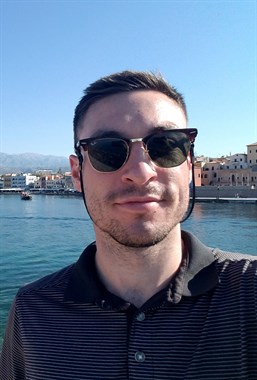 John Aggas, a doctoral student in the Guiseppi-Elie Lab of the Center for Bioelectronics, Biosensors and Biochips in the Department of Biomedical Engineering at Texas A&M University, received a National Science Foundation (NSF) fellowship to attend the 16th NSF International Summer School (2017) on Bio-X: Biocomplexity, Biodesign and Bioinnovation.
John Aggas, a doctoral student in the Guiseppi-Elie Lab of the Center for Bioelectronics, Biosensors and Biochips in the Department of Biomedical Engineering at Texas A&M University, received a National Science Foundation (NSF) fellowship to attend the 16th NSF International Summer School (2017) on Bio-X: Biocomplexity, Biodesign and Bioinnovation.
Aggas started at Texas A&M in the spring of 2016 and is in his third semester. Currently he is pursuing research in the field of biologically responsive and biocompatible polymeric circuit elements for implantable biosensing.
His research consists of utilizing a conductive nanofiber synthesized from polyaniline that is dispersed within a hydrogel to develop both resistive and capacitive circuit elements. These elements, when integrated with biological recognition molecules such as enzymes, can demonstrate a biological response to physiological metabolites, such as glucose or lactate. The result is the ability to create organic circuits that signal levels of lactate and glucose.
Aggas has a diverse background and is referred to as a hybrid engineer. His undergraduate and master’s degrees are in electrical engineering, however, his research concentrates on the interface between electrical and biomedical engineering. Under the guidance of Dr. Anthony Guiseppi-Elie, head of the biomedical engineering department, director of the Biomedical Engineering Division of the Texas A&M Engineering Experiment Station (TEES) and TEES Professor at Texas A&M, Aggas has gained an understanding that the relationship between both fields is paramount for future success.
The 2017 summer school was held in the Mediterranean city of Chania, on the island of Crete, from June 9-14. The fellowship covered all the expenses a student would incur while studying in Greece.
“I’m looking forward to visiting a new country,” said Aggas prior to leaving. “Also, having the opportunity to learn concepts slightly out of one’s own research area, as taught by new professors, is always enlightening.”
The summer school acts as a way to expose graduate biomedical students to the new approaches of mathematical and computational challenges that researchers are currently faced with and immerse students into a cutting-edge field, all while interacting with professors and students from around the world who share similar research interests.